Written by: Salma Chaudhry - Posted on: November 04, 2013 |  Comments
Comments
Google Translation: اُردو | 中文
---
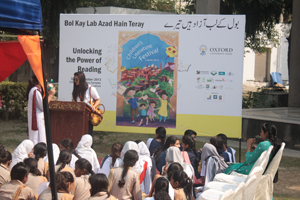 |
“Unlocking the power of reading” was the theme of this year’s Children’s Literature Festival held at Lahore. The festival returned to the city this October with bigger and better events spread over two days from the 30th to the 31st. It had something to offer every kid from all age groups, drawing in children from the public as well as the private sector together for infotainment, dialogue and motivation.
The festival was organised by the Idara-e-Taleem-o-Aagahi (ITA) in collaboration with the Oxford University Press (OUP) at the Children’s Library Complex. The first Children’s Literature Festival was held in Lahore in 2011 and since then, it has been organized in Karachi, Peshawar, Quetta, Islamabad and Bahawalpur, explained ITA programmes director Bela Raza at the opening ceremony. The highlight of the opening was the theme song of the CLF Lahore Humein Kitab Chahiye (We Want Books) written by Zehra Nigah and sung beautifully by a group of students. This year, the event attracted visitors from across the border, who were here to observe the proceedings so they could be replicated in India as well.
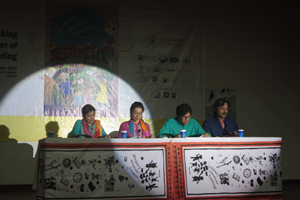 |
Several workshops, interactive discussions, plays, storytelling sessions and declamations for children were held on both days of the festival. Groups of children from various schools participated enthusiastically, but the participation of government and low-income private schools was particularly over whelming and worth noting. “Our children are really excited, this is their first exposure to this kind of an event”, told a Teach For Pakistan instructor when inquired about the response of kids. At the Literature workshops, scholars and teachers worked with students with the aim of conversing with them and posing questions, thus encouraging them to create stories of their own. Painting workshops and competitions were of particular interest to the kids where the volunteers and organizers had set up various activities to provide self-confidence in these young aspiring painters and storytellers.
A touching narrative of a father’s love for his daughter based on Nayer Masud’s short story, “Taoos chaman ki Mayna”, was performed as a dramatic reading by Zambeel Dramatic Readings and Dawn. The story revolved around Kale Khan who was entrusted with the responsibility of taking care of the talking hill maynas at the Royal Peacock Garden. The tale was read so skillfully by the performers that it kept the children captivated for an hour eager to know the fate of Kale Khan who stole a mayna for his daughter.
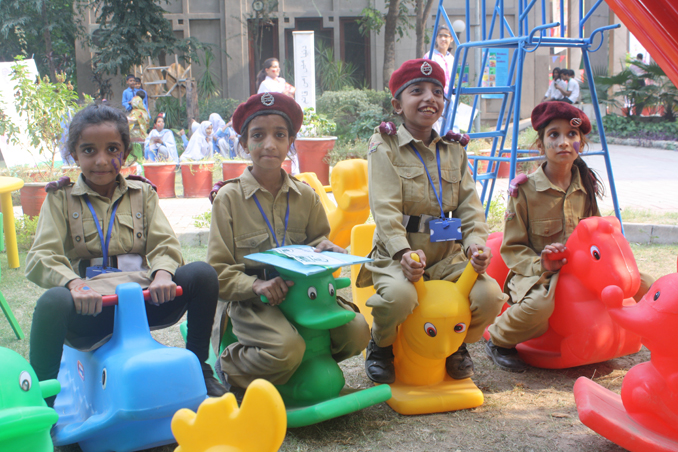 |
In a conversation on peace, Romana Hussain and Chintan Modi, a special guest from India, educated the children on the significance of a tolerant society. The theme of the talk was that peace must be talked about through culture, theatre and literature. Ms. Hussain told the children and their teachers that the issue of text books had become an issue of non-relevance. “We should not stick to that one curriculum, teachers must promote alternative reading and they ought to expand horizons,” she told the participants. Mr Modi said that the story of Partition must be re-written for the children of both countries and the example of France and Germany was an important case study in this regard. A representative of the Seeds of Peace Pakistan Chapter said that their aim is to create respect for diversity so a foundation for peaceful togetherness could be formed. “In diversity, we find harmony or a familiar platform, and we oblige,” he said. As a good will gesture Ms Hussain also presented Modi with an ajrak and Mr. Modi gifted her a bindiya in return. Children were also shown an animated story of “Mukand and Riaz”, the two best friends who got separated in 1947 owing to the partition of the subcontinent.
Fauzia Minallah showed the children an illustrated children's book “When Nature Strikes: Survive, Thrive, We Can Do it!” by M. Patrice Khan and Lissa Lazaro, narrating to them the assorted topics on disaster management and how to cope with challenges and fears. She then asked the children to recount their own stories; it was amazing to see that the kids were able to relate to the illustrations at various levels, with most of them remembering the earth quake of 2005 and its aftermath. They all seemed quite excited about having a chance to see the book illustrated in pictures and communicating with Ms Minallah about natural disasters and their impact on children.
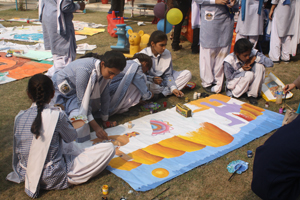 |
At the session called “Bachon kay Dramay”, the kids were ecstatic to know that they would be learning about plays written for them by none other than Imtiaz Ali Taj. Faisal Malik, who is an artistic director at Thezpians Theatre, told them about the famous play Anarkali and had the children’s full attention from the get go. They responded ardently when he asked them about Chacha Chakan to which almost each one of them raised their hand to tell the story of the famous Chahchajee. Thezpians Theatre also performed two acts with Faisal Khalid explaining the morals in the end.
The most admired session at the festival was organised by The Citizens Archive of Pakistan (CAP) incorporating profuse interactive activities in collaboration with their School Outreach Tours, Exchange for Change Programme and Oral History Project. CAP’s School Outreach Tours Team held an interactive classroom session on both days with the aim of teaching the subcontinent's history through question and answer sessions, storytelling, videos and cultural performances, including a play on Pre-Partition Pakistan with a message of forbearance and harmony
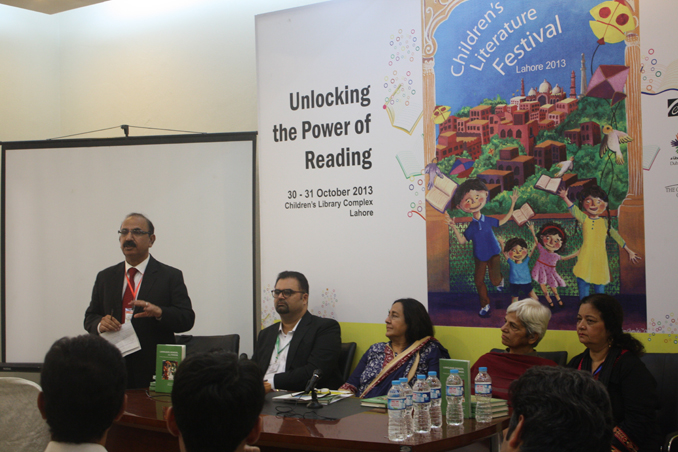 |
Abbas Hussain did a dramaticised narration of Roald Dahl's Matilda, “Contrary to my expectations my session had children who predominantly did not comprehend the English Language easily. I decided to translate the text line by line into Urdu while being animated, using gestures to tell the story via images,” said Abbas. He said he was surprised to see that right after the session, the children set out to grab a copy of the book that had been read out to them. “The festival is thus a great contribution to promoting the habit of book reading in children through various stimulating and fun activities which engage children.” he said.
Little fans of literature and bookworms could be seen discovering the miracle of reading together with their teachers, associates and friends at the CLF Lahore. These literature festivals for kids are indeed an amazing step ahead to help our children develop a habit of reading and promote thinking skills in them, as it is well worth the investment of time and energy of their parents as well as the teachers.